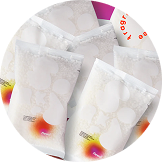Stress is seemingly everywhere: work, relationships, health concerns, and even just in the little moments you encounter throughout the day. It’s impossible to get away from. Left unchecked, it can take a serious physical and mental toll that prevents you from living life to the fullest.
That’s why you need to learn how to increase stress tolerance rather than avoid stress altogether. We’re here to help with this expert guide on increasing stress tolerance.
We’ll share what works for us, from recovery tips to mental techniques, controlled stress exposure, and of course, our stress relief bath soak formulations. These are the #1 way to build a high stress tolerance.
You’re fueling your body with the nutrients it needs most to stop the harmful effects of stress - bioavailable magnesium chloride, B Vitamins, vitamin A, zinc, L-carnitine, and a whole lot more. The best part? The act of indulging in a warm, rejuvenating bath soak itself can fight off stress!
Learn more about how to build stress tolerance below and get back to feeling like you’re in control with Flewd Stresscare, the #1 choice for a magnesium bath soak online.
“I have been using FLEWD a few times a week for 3 months now. I am noticing that I am feeling lighter, less stressed, less easily frustrated and annoyed. My mood is better, and my ability to handle stressful situations is increasing. I just feel better.” - Carrie
“This is my favorite soak. I love it!!! It helps me relax through this extremely stressful time and I’m very grateful for this product. I am making this soak a regular part of my self care routine. It really works!!” - Mary
“Stress care soak is amazing. The best I have tried.” - Diana
Quick Guide on How to Increase Stress Tolerance
|
Strategy |
Why It Helps |
Quick Tip to Get Started |
|
Try a Flewd Stresscare Soak |
Refuels your body with stress-fighting nutrients like magnesium, B vitamins, and nootropics through skin absorption |
Soak for 20 minutes, 1 to 2 times a week. Use Sads Smashing, Anxiety Destroying, or Insomnia Ending depending on how stress shows up for you |
|
Create Recovery Gaps During the Day |
Breaks between stressors give your nervous system a chance to reset instead of staying stuck in high alert |
Add 5 to 10 minute pauses after mentally intense tasks - don’t just power through |
|
Move Your Body |
Movement helps regulate cortisol, process adrenaline, and build resilience |
Walking, stretching, or gentle workouts should become a regular part of your routine |
|
Train With Hormetic Stressors |
Short-term stressors like cold plunges or sauna train your body to bounce back stronger |
Start with 30 to 60 seconds of cold water at the end of your shower. We cover other strategies below |
|
Rewire With Reframing and Journaling |
Helps shift your perception of stress and build a more flexible mindset |
Write 3 things that felt overwhelming and one way you could interpret each differently |
|
Improve Sleep Quality |
Deep sleep is where your body resets your stress systems. This is non-negotiable |
Cut screens 1 hour before bed, and add a magnesium-rich soak if winding down is hard |
|
Cut Down on Overstimulation |
Constant inputs keep your stress response activated, even when nothing is wrong |
Unfollow 5 accounts that spike your stress and replace them with calming ones. Set daily limits on your screen time. Say “NO” to more people in your life |
What is Stress Tolerance: Definition and Importance
First things first - a stress tolerance definition. This is your nervous system’s ability to stay grounded and functional when life gets overwhelming.
It’s not about pretending things don’t bother you. It’s how your body and brain respond after a tough moment. Can you bounce back quickly, or does your system spiral into fight-or-flight mode and stay there?
People with higher stress tolerance can face pressure without completely shutting down. They aren’t impervious to stress - their baseline just stays more stable. Their heart rate comes back down faster, their muscles unclench, and their thoughts stay clearer.
On the other hand, low stress tolerance shows up in the form of irritability, fatigue, anxiety, and burnout - even from things you KNOW shouldn’t be a “big deal.” Maybe it’s the thought of a deadline that really doesn’t matter all that much, or the laundry waiting for you at home.
Understanding (and building) your stress tolerance matters for one simple reason: stress is inevitable. The only thing you can do about it is improve your capacity to handle it and recover from it. That’s what we’re going to help you do in this guide on how to increase stress tolerance.
But are you struggling with a low stress tolerance in the first place? Let’s find out.
Signs You Have a Low Stress Tolerance
Most people don’t realize how low their stress tolerance actually is until they’re forced to pay attention. Your nervous system could be trying to tell you something if you’re constantly tired, reactive, or overwhelmed. Watch out for these signs:
- You get irritated easily by things that didn’t used to bother you.
- Minor changes in plans throw you off or make you feel panicked.
- You feel emotionally drained after conversations or meetings.
- You can’t focus or retain information when pressure is on.
- You replay stressful interactions in your head for hours or days.
- You wake up tired, even after a full night of sleep.
- You struggle to relax, even in calm environments.
- You dread tasks that once felt manageable or enjoyable.
- Your body feels tense constantly - jaw tight, shoulders up, gut clenched.
- You crash after stress - headaches, stomach issues, or full exhaustion.
- You avoid challenges not because they’re hard, but because they feel impossible.
- You rely on numbing behaviors (scrolling, snacking, overworking, drinking) to calm down.
We’re asked all the time, can stress cause sore muscles? Yes - that’s another one of the many physical consequences of letting stress wreak havoc on your body.
Stress tolerance isn’t about whether your life is objectively stressful. It’s about how much stress your system can handle before it starts to crack. So if any of this sounds familiar, you probably have a low stress tolerance.
So, can you increase your stress tolerance, or are you stuck with it?
Can You Increase Your Stress Tolerance?
The short answer is yes - you absolutely can improve your resiliency to stress. Your tolerance to stress is shaped by your biology, habits, past experiences, and how you recover.
You definitely can’t erase stress completely, but there are plenty of measures you can take to increase your body’s ability to handle it. It’s as simple as supporting your nervous system, building healthier responses, and changing how you restore yourself after a stress spike.
But what does that look like in practice? Contrary to what you might assume, you don’t have to become a monk. We’ll show you how to increase your stress tolerance below with a few simple tweaks to your daily routine!
How to Increase Stress Tolerance: Top Tips for Increasing Stress Tolerance Fast
From giving yourself time to recover throughout the day to smart exposure to stress to “train” your nervous system, and even simply trying magnesium vs ashwagandha for stress, here is how to build stress tolerance quickly and easily.
Create Recovery Gaps Throughout Your Day
Most people wait until they’re maxed out to take a break. But if you want to learn how to increase stress tolerance, recovery has to come before the crash. Think of your day like an interval workout: the work is manageable, but only if there’s rest built in. Start small with:
- Two minutes of deep breathing between meetings
- A 10-minute walk after lunch - no phone
- Staring out a window (yes, really) for five minutes to reset visual overload
These little breaks can make a big difference by giving your nervous system space to reset so it doesn’t spiral.
Move Your Body (But Keep It Nervous-System Friendly)
Movement supports circulation, clears stress hormones, and helps your brain shift from "threat" to "safety." But intensity matters. A punishing workout could definitely have the opposite intended effect if you’re already feeling overwhelmed.
Instead, try a slow walk after dinner (we already suggested doing one after lunch - same idea here) - or wake up and stretch for 10 minutes rather than doom scrolling in bed. A thoughtful workout plan that gets you in the gym 3-4 days a week can go a long way, too.
Use Magnesium and Nutrient Support to Recharge Daily
What you feed your body can make or break your stress tolerance. We get asked all the time, does magnesium help with stress? Yes - but here’s the problem: it’s also the nutrient your body burns through most when you’re stressed.
That’s the conundrum. You need magnesium when you’re stressed, but you have less magnesium than you need when you’re stressed. To make matters worse, this nutrient is absorbed really poorly through diet and oral supplements.
Then there’s the confusion around the best magnesium for stress, with so many different forms at your fingertips - magnesium taurate vs glycinate, magnesium sulfate vs magnesium chloride, the list goes on and on.
Magnesium isn’t the only nutrient you need, either. There are so many B-vitamins and micronutrients tied to mood, muscle function, and nervous system regulation. That’s why the best advice you’ll find in this guide on how to increase stress tolerance is getting a bath soak.
Try a Flewd Stresscare Soak
Our bath soaks are among the most effective ways to calm your nervous system and replenish depleted nutrients - without forcing pills down or dealing with uncomfortable side effects.
A warm bath opens your pores and boosts blood flow. Then, the ingredients in your soak (in this case, bioavailable magnesium chloride and other powerful vitamins, nootropics, amino acids, and more) can work their way into your bloodstream effortlessly.
We built our Stresscare Bundle to meet you wherever stress hits hardest with our most popular soaks:
- Sads Smashing: Combines magnesium, Lithium Orotate, Vitamin B6, and Niacin, plus mood-boosting essential oils like lemon and patchouli to help lift heavy emotional weight.
- Anxiety Destroying: Formulated with magnesium, a full B-complex, and elemental zinc to calm the mind, regulate neurotransmitters, and settle that racing, restless energy.
- Insomnia Ending: Powered by magnesium, Vitamin A, Vitamin E, and L-Carnitine to support sleep onset, regulate energy cycles, and quiet late-night overthinking.
- Ache Erasing: Includes magnesium, Vitamin C, Vitamin D, and Omega-3s to soothe tense muscles, reduce inflammation, and relieve stress stored in the body.
These soaks are so easy to use, too. Rip open a full pouch and dump it into a warm (not scalding hot) tub. Kick back and relax for at least 20 minutes (longer if you can) and feel the stress melt away as you meditate, read a book, listen to music - whatever you prefer.
You can rinse off after if you want, but we actually recommend patting yourself dry instead so your skin can continue to absorb what it needs. The ingredients are 99% natural, so there’s no need to worry about irritation or side effects.
You can use the soaks 2-3 times a week (or more if you’re struggling with a really low stress tolerance). This is your one-way ticket to a stronger stress response. Shop now and feel the difference firsthand as we continue through our guide on how to increase stress tolerance!
Train Your Brain with Controlled Stress (aka Hormetic Stressors)
It sounds crazy, but it makes sense when you think about it. You can train your body and mind to handle stress better by exposing them to stress. It’s just like how vaccines expose you to a virus so you can handle it better when you encounter it, or how you train your body in the gym.
This practice is called hormesis, and it works because it mimics the stress response in a controlled way. Here are some of the most common ways you can go about it:
- End your shower with 20 seconds of cold
- Try holding your breath after an exhale
- Ease into a short sauna session if you have access
There’s a fine line, though. You don’t want to overdo it here. Use these cautiously.
Rewire Thought Patterns With Reframing + Journaling
Mental stress tolerance starts with how you interpret events. Is it a threat, or a challenge? Reframing helps you shift that perception. Pair this mindset with:
- What did I handle better today than last week?
- What’s one thing I can let go of right now?
- What am I still carrying that isn’t mine?
Slowly but surely, you’re reprogramming how you view stressors. You’re helping your brain stay out of panic mode and return to baseline more easily.
Improve Sleep (This is Where Your Body Builds Stress Tolerance!)
A good night’s sleep is one of the best ways you can go about increasing stress tolerance. While you’re asleep, your body clears stress hormones, consolidates emotional memory, and repairs tissues. In other words, you’re capping your tolerance to stress if you’re underrecovered.
Stick to a consistent bedtime, get morning sunlight exposure, and practice good sleep hygiene. You can also use our Insomnia Ending Soak for this. It has the best magnesium for sleep with Vitamins A & E, and L-Carnitine. It’s included in the Stresscare Bundle we referenced earlier!
Cut Down on Chronic Overstimulation
The final tip we want to share in our guide on how to increase stress tolerance is to be proactive and start cutting things out. Your system can’t recover if it never gets a break.
Constant notifications, background noise, and multitasking all drain your stress capacity. You can’t cut out all sources of stress, but you can curate a better mental state by:
- Turning off push alerts
- Leaving your phone outside the bathroom or bedroom
- Scheduling focus blocks without screens or input
Creating “off” time helps your brain reset. Less noise = more capacity to handle what actually matters. Similarly, you can start saying no to more things and creating better boundaries. Whether that’s energy vampires in your life or offloading responsibilities, there’s nothing wrong with being more cut-throat!
Final Words on How to Build Stress Tolerance
We hope this guide on how to increase stress tolerance helps you get back to living life on your terms and not feeling so overwhelmed all the time. The key takeaway from this conversation is that your low stress tolerance doesn’t have to be something you put up with.
The fastest way to get control? Combine nervous-system-friendly habits with daily nutrient support and intentional recovery. From movement and sleep to magnesium and micro-breaks, there are so many ways you can go about increasing stress tolerance.
Perhaps the best piece of advice from this guide on how to build stress tolerance, though, is adding our epsom salt substitute to your self-care ritual. Slide into your first bath and feel the shift with Flewd Stresscare!
Frequently asked questions
Why is my stress tolerance so low?
Chronic stress, nutrient deficiencies (especially magnesium or B vitamins), poor sleep, unresolved trauma, or simply never learning how to regulate your nervous system can all cause low stress tolerance.
What are the four A's of stress management?
The four A's are: Avoid, Alter, Adapt, and Accept. They're simple mental frameworks to help you respond more effectively to stressful situations.
What are the 5 factors that influence your stress tolerance?
Your stress tolerance is shaped by genetics, lifestyle habits (sleep, diet, exercise), past trauma, current life demands, and your ability to mentally reframe stressors. Our guide on how to increase stress tolerance helps you optimize each of these elements.
How long does it take for the body to recover from stress?
As we cover in our guide on how long to recover from burnout, it depends! Your body typically needs 20 minutes to several hours to return to baseline if you allow recovery time after an acute episode. Recovering from chronic stress can take days, weeks, or months depending on how bad you let it get before correcting the issue.
What is the best stress relief supplement?
Look no further than our magnesium bath soaks here at Flewd Stresscare. You get all the nutritional support you need in its most bioavailable form, paired with the powerful stress-relieving act of soaking in a warm bath while practicing meditation, mindfulness, deep breathing, or whatever works for you. Try it today!
























































